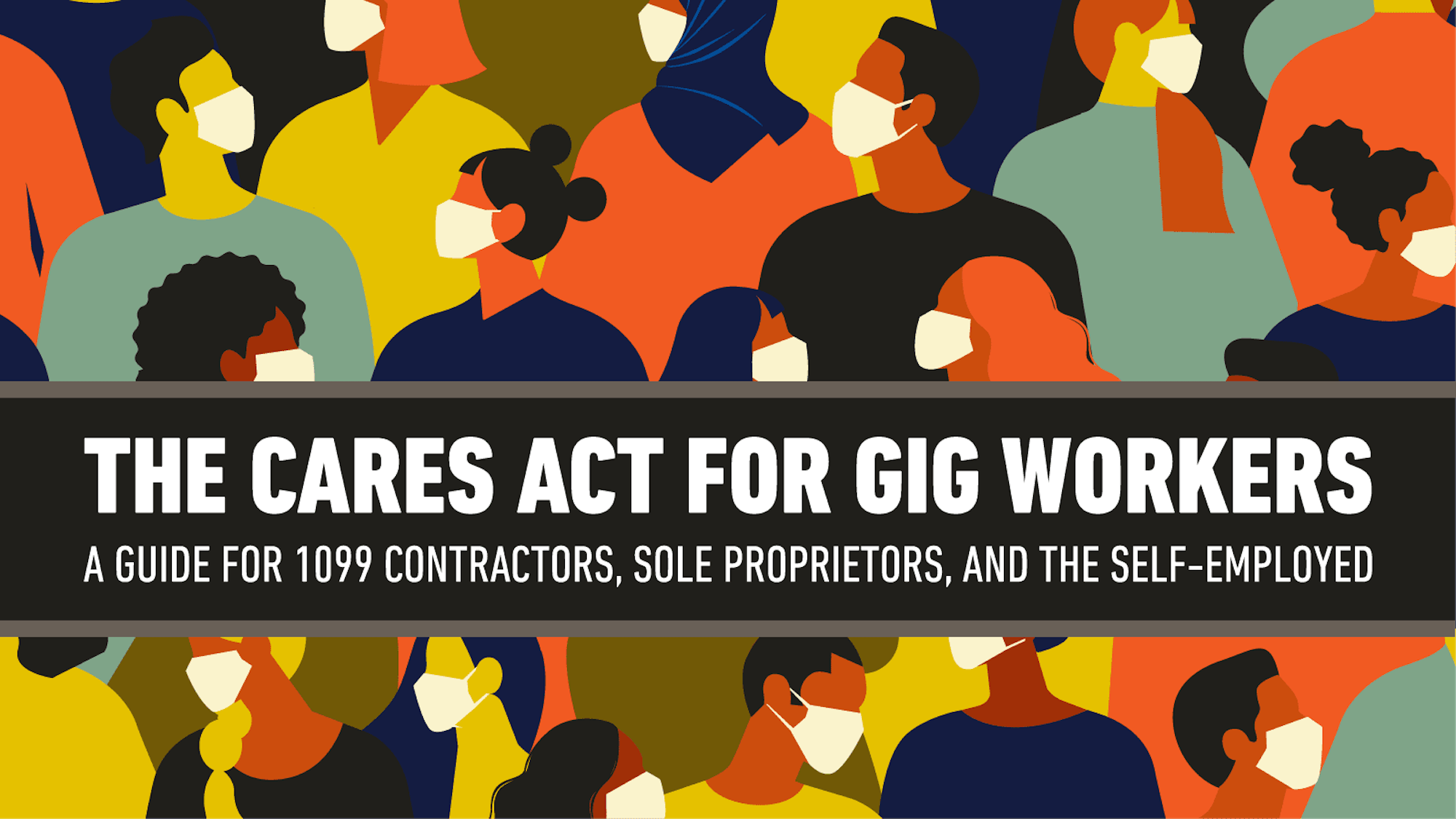What the National CARES Act Means for 1099 Contractors & the Self-Employed


by Todd Cope, CEO
If you’re a 1099 contractor or self-employed, you may be eligible for benefits from the Coronavirus Aid, Relief, and Economic Security (CARES) Act and other measures enacted by Congress.
Keep in mind, though the law has passed, the government is still writing regulations for how it will be implemented. That means things can change. This article offers information about what we know so far, but should not be considered the final word. It also should not be construed as financial advice. Speak with your financial adviser or tax lawyer for professional guidance.
Topics covered:
- Individual Stimulus Checks
- Paycheck Protection Program
- Unemployment Benefits for Self-Employed Workers
- Paid Sick Leave for Self-Employed Workers
- Student Loan Payment Deferrals
- Early Retirement Withdrawals
Most People Will Receive a Stimulus Check
Most U.S. citizens will receive a stimulus check of up to $1,200 per adult and an additional $500 for each qualifying child. The amount of funds you will be eligible for will be determined based on your most recent tax filings.
The first step you should take right now is to file your 2019 tax return, if you have not already. And, if you are getting a tax refund, choose to receive that refund through direct deposit. This will ensure that the IRS has the most current tax filing and direct deposit information for you, which they will use to determine individual stimulus check amounts.
Learn more: How to track your coronavirus stimulus check now: What to do to get your status
You Can Apply for the Paycheck Protection Program
Workers who are part of the gig economy or are self-employed are eligible for the CARES Act Paycheck Protection Program (PPP). The program offers a loan that may be forgiven if you use it to cover certain expenses including wages. Independent workers are eligible if you are:
- An individual who operates as a sole proprietor
- An individual who operates as an independent contractor
- An individual who is self-employed who regularly carries on any trade or business
Workers who are part of the gig economy or are self-employed may be eligible for the CARES Act Paycheck Protection Program. The program offers a loan that may be forgiven if you use it to cover certain expenses including wages.

How much can I borrow?
Loans can be up to 2.5x your average monthly payroll cost (not to exceed $10 million). To calculate the amount you’re eligible to borrow as a sole proprietor, independent contractor, or self-employed individual with NO employees:
- Look at line 31 on your 1040 Schedule C tax form from your 2019 taxes to find your net profit amount.
- If this amount is over $100,000, reduce it to $100,000. If the amount is zero or less, you are not eligible for a PPP loan.
- Divide your net profit number by 12 to get a monthly average.
- Multiply your monthly average by 2.5.
If you have filed for or received an Economic Injury Disaster Loan (EIDL) made between January 31, 2020 and April 3, 2020, there may be additional steps required. If you have employees, review the full rules here.
Can the loan be forgiven?
Borrowers are eligible to have their loan forgiven up to the amount spent on certain items. Only expenses incurred during the 8-week period following the origination date of the loan count toward this eligibility. Allowable items include:
- Payroll costs including benefits
- Interest on the mortgage obligation incurred in the ordinary course of business before February 15, 2020
- Rent on a leasing agreement that began before February 15, 2020
- Payments on utilities (electricity, gas, water, transportation, telephone, or internet) for service which began before February 15, 2020
How can I request loan forgiveness?
You can submit a request to the lender that is servicing the loan. The request will include documents that verify the number of full-time equivalent employees and pay rates, as well as the payments on eligible mortgage, lease, and utility obligations. You must certify that the documents are true and that you used the forgiveness amount to keep employees and make eligible mortgage interest, rent, and utility payments. The lender must make a decision on whether or not to forgive the loan within 60 days.
When does my loan have to be paid off? And how much is the interest?
Loan balances that are not forgiven are due two years from the origination date. You do not have to make payments for the first six months. However, interest will accrue over that time. The interest rate is fixed at 1.0%.
Do I need to pledge collateral for this loan?
No collateral is required.
When can I apply?
- Starting April 3, 2020, small businesses and sole proprietorships can apply.
- Starting April 10, 2020, independent contractors and self-employed individuals can apply.
However, many banks are still scrambling to process these loan applications — so don’t expect all banks to be ready by these dates. If your bank is not yet accepting applications, continue monitoring their website, stay in touch with your banker, and look for email updates from them.
Where can I apply?
You can apply through any existing SBA lender or through any federally insured depository institution, federally insured credit union, and Farm Credit System institution that is participating. You should consult with your local bank or lender to see if they are participating.
What do I need to apply?
You will need to complete the Paycheck Protection Program loan application and submit it with the required documentation to an approved lender by June 30, 2020. If you want to begin preparing your application, you can download the sample form here. You will also need to provide your lender with tax or earnings documentation.
Learn more:
- Treasury.Gov Paycheck Protection Program Information Sheet for Borrowers (3/31/20)
- Interim Final Rule: Paycheck Protection Program (4/2/20)
- Interim Final Rule (Supplement): Additional Eligibility Criteria (4/15/20)
- Treasury.Gov PPP Frequently Asked Questions
To apply, contact your local bank.
Note: This program is NOT the same as the Small Business Administration’s Disaster Loan Program.

You May Be Eligible for Unemployment Benefits
The CARES Act created a new program, called Pandemic Unemployment Assistance, that extends benefits to gig workers, contractors and others who wouldn’t otherwise qualify for unemployment compensation but can’t work due to the coronavirus emergency. As a gig worker, you may be eligible for up to $600 per week plus half the average unemployment benefit in your state.
Learn more: NBC News: Coronavirus Unemployment Benefits
You Have Access to Paid Sick Leave
The CARES Act and other measures extend paid sick leave and paid family leave to small business owners and freelancers, which can be claimed as a credit on your taxes.
Learn more: Freelancers Union: How Freelancers Can Access Paid Sick Leave in a Coronavirus Emergency
If You Have Federal Student Loans, You Can Skip Payments until September 30 — Interest Free
The CARES act gives federal student loan borrowers the option to stop paying your federal student loans. If you choose this option (and you don’t have to), you will not face any penalties or late fees. Through September 30, 2020, no interest will accrue on your federal student loans. This means that for this period, the interest rate will be set to 0% and no new interest will accrue on your federal student loan balance.
Through September 30, 2020, no interest will accrue on your federal student loans. This means that for this period, the interest rate will be set to 0% and no new interest will accrue on your federal student loan balance.
If you are part of a student loan forgiveness program, pausing your student loan payments will not negatively affect your eligibility for forgiveness. This doesn’t apply to all student loans. This is only for federal student loans that are owned by government agencies such as Direct Loans. It does NOT include private student loans or FFEL Loans.
Learn more: Forbes: Federal Student Loan Payments Will Be Suspended Through September 30
You Can Take Money from Your Retirement Program Without Penalty
One provision in the CARES Act lets investors of any age take as much as $100,000 from retirement accounts this year without paying the usual 10% early withdrawal penalty. They also can avoid taxes on the withdrawal if the money is put back in the account within three years. If it can’t be returned, taxes can be paid over three years.
Learn more: Fortune: Retirement Withdrawal Penalties Waived Under Coronavirus Stimulus Package
You Should Follow the SBA to Stay Informed
To stay up-to-date on the latest information and learn more about any of the benefits outlined above, visit the Small Business Administration (SBA)’s COVID-19 webpage.
The U.S. Chamber of Commerce is also offering valuable resources about the CARES Act and how to manage the COVID-19 pandemic as a small business owner.


